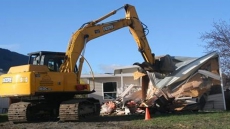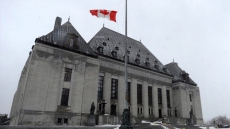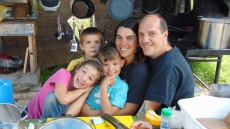MONTREAL — Jean-Marc Crete sits attentively on his platform, mic in left hand, the potential winning ball freshly released from a constantly buzzing machine that provides the soundtrack to the Montreal bingo game.
He picks up the little yellow plastic ball and delivers a monotone, bilingual announcement.
"O soixante-sept; O sixty-seven," Crete calls, gently slotting the ball in a socket on a console that also acts as his desk.
The players, mostly over 60, follow his every call, methodically pressing their daubers on their papers, releasing a small amount of translucent gooey liquid onto the right number.
Crete, who's about to hit 61, says he believes "everyone has a little bit of a gambling bug."
But for years young people who caught the bug have been getting their fix elsewhere.
The remaining 50 or so bingo halls in Quebec are losing millions of dollars every year as their traditional clients die off and are not replaced.
"B cinq; B five," Crete calls into his mic. "When we were able to smoke inside bingo halls they were full of people. 'G cinquante-cinq; G fifty-five.' Then they put in the no-smoking rule and a lot of smokers never came back."
The Quebec government, which strictly regulates the game, has for years tried to revive the seemingly moribund industry but profits have continued to slide.
The golden age of bingo in Quebec was in the '60s and '70s, after the province's Quiet Revolution reduced the influence of the Roman Catholic Church.
Women — seeking company with friends and a break from their husbands — flocked back to church, this time not to the main floor but to the basement, for the highly popular bingo soirees.
Some promoters in Quebec even held bingo games in stadiums, where thousands of players took their shot at winning cars, vacations and lots of cash.
Jeanne, 78, sitting a few feet away from Crete, divides her attention between his calls and the gossip of her two friends at the table.
"Way back when, in the early '60s, we used to play in Kahnawake," she said, referring to the native reserve south of Montreal. "We would play for food baskets. You know, potatoes, regular groceries."
Today it's not unusual for players to win hundreds or thousands of dollars in one night but the chance of winning big is still not enough to attract young people to the game.
It's not that difficult to understand why.
Crete, whose uniform is a sleeveless, button-down red shirt and black tie, looks like a fast-food counter employee in a dingy hot-dog joint.
His calls echo off the walls of the sparsely attended warehouse-like hall, illuminated harshly with tube lights hanging overhead from an exposed, green-painted ceiling.
No alcohol is served and games can last hours.
In an era of short attention spans and competition from all sorts of digital-based gambling offerings, traditional bingo seems archaic and quaint.
Hurt most by the decline of bingo are the roughly 800 non-profit organizations in Quebec such as churches and community groups that depend on bingo to finance their activities.
Only non-profits in Quebec are allowed a bingo operating licence, according to strict government regulations.
In order to open a bingo hall legally, non-profits with bingo licences must pool together and find an independent entrepreneur to open a facilty.
Profits are divided monthly between the bingo operator, who pays employee salaries and other overhead costs, and the non-profits associated with the hall, according to a formula developed by the provincial government.
About five years ago Loto-Quebec created Kinzo, modelled after the European version of bingo, the profits of which are turned over to community groups as a way to make up for the shortfall from traditional bingo.
The game is tailored to a younger generation, explains Marie-Claude Rivet, spokeswoman for Loto-Quebec, the province's gaming authority.
Kinzo games are shorter and some halls where it is played serve alcohol, but profits from the game are still not enough to stem the losses from traditional bingo.
That's why the province's bingo association, the Secretariat du Bingo, is pushing the government to "modernize the game" by turning halls into a type of mini-casino where bingo, Kinzo and other participatory games can be played in the same room.
The government is also considering a plea from the secretariat to allow halls to run their own "reseau" games, where players across the province play together, electronically, for a chance at bigger jackpots and prizes.
The province currently only allows two "reseau" games a day, both controlled and run by Loto-Quebec.
It remains to be seen if the latest attempt by the industry to attract young people and increase profits will work.
For now, the atmosphere at the bingo club in southwest Montreal is good enough for Joyce Lajeunesse, 70, who says her husband drives her to the hall twice a week.
"When I bring my family members, they get embarrassed because when I yell, everybody knows I won," she boasted.
Lajeunesse said she has taken home more than $25,000 in 20 years of playing bingo — not enough to come out ahead, but that's OK, she said.
"I like to come and talk to people," she said. "My husband and I are alone."




